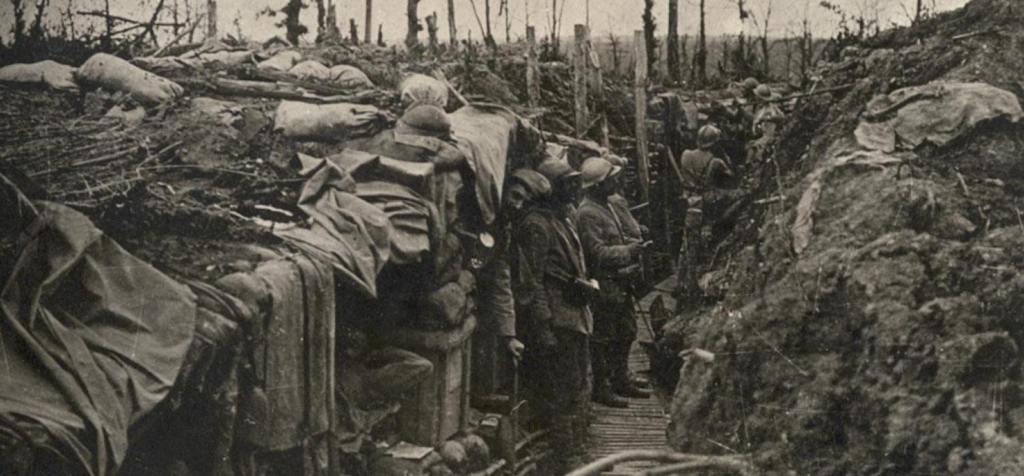
The Great War, more known as WW1. One of the most significant events in History if you ask me. We all know it was a horrible time in life due to the deaths, casualties and many more, but do we ever wonder what conditions the soldiers faced on the front lines?
Well, if you have wondered, keep reading, and I will tell you a few interesting facts you need to know about life for Scottish soldiers on the western front.
Reasons why Scots signed up to fight in WW1!
There were many reasons why Scottish soldiers signed up for war in ww1, including propaganda, the short war theory, patriotism, pals battalions, peer pressure, martial tradition and many more.
Propaganda encouraged men to sign up for the war by targeting them, making civilians feel they were needed and their country would desperately fail without them. Propaganda would brainwash people into thinking the war was all hopes and dreams. Therefore many people signed up to fight.
The short war theory was that all soldiers thought the war would be over in a couple of months and would be over for Christmas. Therefore, many Scots signed up as they did not expect it to be that serious.
Another reason many Scots joined the war was pals battalions, many scots chose to sign up for the war because their friends had signed up, and they liked the thought of being sent off to war and fighting with their friends. They also did not want to be seen as weak by their friends, so they felt forced to join. For example, the Hearts football club all signed up for war together. This links in with my next point on peer pressure.
Peer pressure was a big reason why many Scots joined the war, as they felt like they were being forced into it or pressured into it by their families, friends or even passersby on the street. Women in the Road started a campaign where they handed out white feathers to men in the street, and these white feathers symbolised cowardice. The white feather campaign was also handed out to many conscientious objectors, but this happened further along our time scale when conscription was set up.
The martial tradition was another critical factor for why men signed up for the ww1. This was when many men signed up because their papa, dad or men in the family had fought in wars prior, and therefore they wanted to keep up the tradition of fighting in their family.
There were also many other reasons why Scots signed up to fight in the first world war, but these were the main reasons.

Conditions in the trenches of ww1!
The trenches in ww1 were, quite frankly- awful. They came with many bad conditions, like disease, pests and many other things that caused health issues, mental health issues and many more negative aspects of war.
The trenches had many conditions, including pests, disease, shell shock, fear of death, hunger., and many others.
In the trenches, many different pests could be found. To start, some rats grew to the size of feral cats, as the rats fed on the dead bodies of soldiers and grew from these. This meant the soldiers had to live amongst huge rats running about. Another pest that was found in the trenches of ww1was lice. It would be like living in the creases of soldiers’ kilts and their hair, which also leads to a lack of good hygiene, as these lice could feast and bread.
Another condition in the ww1 trenches was disease. Due to a lack of basic dental hygiene, like brushing their teeth, soldiers gained a dental disease called trench mouth. Trench mouth was highly contagious and severe during the first world war. Another disease that soldiers gained in the trenches was trench foot. This was achieved by standing in the mud all day and their feet being soggy, leading to disease.
Another condition in the trenches was shell shock. Shell shock was a mental order that many soldiers suffered from. Symptoms included fatigue, tremor, confusion, nightmares and impaired sight and hearing. In the early years of World War One, shell shock was believed to result from a physical injury to the nerves and exposure to heavy bombardment. This severe cause was not solved until several years after the first world war.
The fear of death was a big part of the trenches. Soldiers had to deal with many losses, especially if they had been fighting with friends and family, saw hundreds of dead bodies daily and constantly wondered if they would be next. This was named the fear of death, which explains itself pretty well.
Hunger was another condition that many Scottish soldiers suffered from during world war I, as it was difficult to get food on the front lines. This is also why rationing was introduced so there could be more food on the front lines, but there was never enough for starvation and hunger to disappear. During ww1, soldiers ate tinned rations and hard biscuits staples once again. But their diet also included vegetables, bread and jam, and boiled plum puddings. This was washed down by copious amounts of tea, which, as you can see, is not the most fulfilling diet for growing men and boys who must be fit enough to fight daily.

If you want to find out more about rationing, click here!
To see more articles on History, other essential things, recipes, and more, click this link here!
